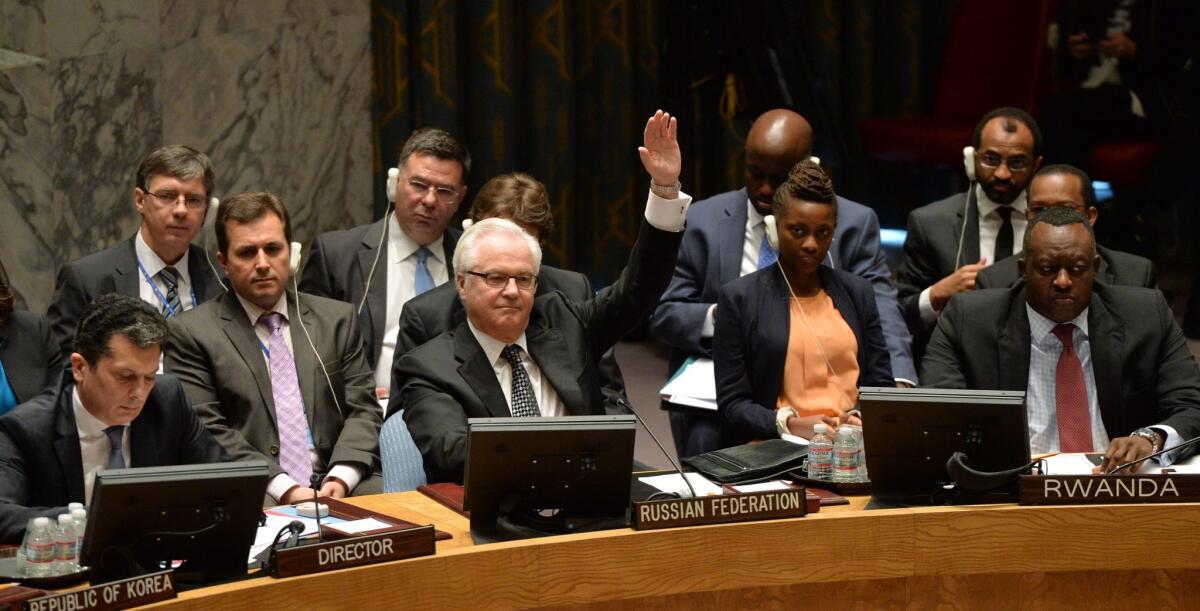Opinion: Stand up for humanity? In the case of Syria, Russia and China say no.

- Share via
What does it take to be considered a war criminal these days?
Member nations of the United Nations Security Council on Thursday sought to refer the Syrian government to the International Criminal Court over compelling evidence that President Bashar Assad’s troops have used chemical weapons in that country’s brutal civil war. But Assad, and his victims, will not get their day in court because both Russia — Assad’s longstanding ally — and China vetoed the measure.
The vetoes were expected, but that doesn’t make the situation any less frustrating. That military forces can use chemical weapons with impunity is not a good precedent for the world. Unfortunately, the international community has ineffectual options to bring the regime to justice (and yes, rebels have committed atrocities as well, but the vast preponderance have been committed in Assad’s name).
Part of the problem is that the court, based at The Hague, is an international anomaly. It has jurisdiction under limited circumstances among its member nations, but to deal with war crimes and crimes against humanity committed by nonmembers, it must receive a referral from the Security Council. Yet any of the council’s five permanent members — China, France, Russia, Britain and the United States — can veto any measure it doesn’t like, which is a strong hand wrapped around the throat of justice.
The vetoes Thursday came shrouded in fluff. China’s deputy permanent representative, Wang Min, said sending Syria to court would do nothing to end the hostilities. Russian Ambassador to the United Nations Vitaly Churkin said the vote seemed aimed at displaying disunity among the members.
“The draft resolution rejected today reveals an attempt to use the ICC to further inflame political passions and lay the groundwork in the end for eventual outside military intervention,” Churkin said. “We’re convinced that justice in Syria will eventually prevail. Those guilty of perpetrating grave crimes will be punished, but in order for this to happen, peace is first needed.”
Peace would be good. But that isn’t likely to happen until Assad wins, which seems likelier as time goes on. And it’s hard to imagine Russia backing a war crimes referral then.
So the end result is an international display of fecklessness on behalf of the United Nations. According to the New York Times, after the vote Gerard Araud, the French ambassador to the U.N., expressed his sense of helplessness to reporters: “There is a moment when you realize you are powerless in front of barbarians and their supporters.”
That powerlessness does nothing to bolster the United Nation’s reputation. Before the vote, Jan Eliasson, deputy secretary-general, warned: “If members of the council continue to be unable to agree on a measure that could provide some accountability for the ongoing crimes ... the credibility of this body and the entire organization will continue to suffer.”
Indeed, the United Nations’ credibility is suffering. The Times editorial board on Sunday called for Assad to be referred to The Hague for trial, though it recognized that Russia would likely veto that action (China’s veto was less certain). Still, the editorial said the measure should be put to a vote and that, “if Russia vetoes it, then at least the world will be able to see who stands for humanity and who stands against it.”
So now we know.
More to Read
A cure for the common opinion
Get thought-provoking perspectives with our weekly newsletter.
You may occasionally receive promotional content from the Los Angeles Times.










